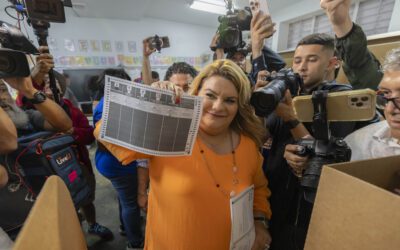
Former president Donald Trump has been indicted on 91 charges–so far–on both the state and federal level. These charges include conspiracy, obstruction, willful retention of national defense information, and more. (AP Photo/Alex Brandon, File)
Over the past several months, former president Donald Trump has become the center of not one, not two, not three, but four criminal investigations, at both the state and federal level.
The frontrunner for the 2024 Republican presidential nomination faces dozens of charges across the four cases he’s been indicted in–91 in total–and has pleaded not guilty to all of them.
Trump has denied wrongdoing in each case and insisted, despite mountains of evidence, that the charges are “fake.”
Here’s a breakdown of everything the former president has been charged with and where all of the cases stand:
Election Inquiry in Georgia
On Monday, Aug. 14, Trump was criminally charged in the state of Georgia over his efforts to overturn the 2020 election.
Trump has been charged with 13 counts in this case, including a count of violating Georgia’s Racketeer Influenced and Corrupt Organizations Act (RICO), which calls for a minimum sentence of at least five years in prison and a maximum of up to 20 years in prison.
Trump is also charged with soliciting a public officer to violate their oath, conspiring to impersonate a public officer, conspiring to commit forgery in the first degree, and conspiring to file false documents.
Eighteen others have also been indicted by an Atlanta grand jury in this case, all of whom were similarly charged with RICO violations. Trump, along with these co-conspirators, is accused of orchestrating a “criminal enterprise” to reverse the results of the 2020 election in Georgia.
This indictment follows a two-and-a-half year investigation spearheaded by Fulton County District Attorney Fani Willis. Willis’ investigation began after news broke of Trump’s Jan. 2, 2021 phone call to Georgia Secretary of State Brad Raffensperger, in which Trump urged Raffensperger to “find” 11,780 votes for him.
The indictment alleges that Trump and several co-defendants created false Electoral College documents and recruited individuals to convene and cast false Electoral College votes at the Georgia State Capitol in Fulton County on Dec. 4, 2020. It also alleges that the former president harassed election officials, workers, and volunteers.
These are just some of the many accusations leveled against Trump and the 18 others charged in the case.
A trial date has yet to be set, but Willis has requested that the trial begin on March 4, 2024.
Jan. 6 and 2020 Election Inquiry
In addition to the Georgia charges revolving around Trump’s actions to subvert the 2020 election results, there’s also the federal inquiry into what happened in the two months between Election Day in 2020 and Jan. 6, 2021, when Trump schemed to overturn his loss in the presidential election.
Special Counsel Jack Smith is arguing that during that time, Trump “mounted a wide-ranging campaign to subvert Joe Biden’s victory in the presidential election.”
In a 45-page indictment, Smith laid out a mountain of evidence showing that Trump and his allies spread false information about voter fraud, urged Republican state officials to undermine the results of the election, assembled false electors, and pressured former Vice President Mike Pence to “unilaterally toss out the legitimate results.”
These actions culminated, prosecutors argue, in the events of Jan. 6 2021, when an insurrection broke out at the US Capitol, resulting in five deaths and hundreds of injuries.
Trump has been indicted and charged with:
- one felony count of conspiracy to defraud the United States by “using dishonesty, fraud, and deceit to impair, obstruct, and defeat” the government’s process of collecting, counting, and certifying presidential election results.
- two felony counts (including one conspiracy count) of obstructing an official proceeding, related to the disruption of Congress’ certification of the 2020 election results on Jan. 6.
- one felony count of conspiracy to deprive Americans citizens of their right to vote and have their vote counted.
On Aug. 10, prosecutors with Special Counsel Jack Smith’s team asked the judge in the case to set a Jan. 2, 2024 trial date.
Classified Documents Case
In June, Trump was indicted and charged over his mishandling of classified documents that he kept after leaving office.
Smith, who is also overseeing the investigation in this case, alleges that Trump illegally left the White House with classified information “regarding defense and weapons capabilities of both the United States and foreign countries; United States nuclear programs; potential vulnerabilities of the United States and its allies to military attacks; and plans for possible retaliation in response to a foreign attack.”
In this case, the former president has been charged with 32 felony counts of willful retention of national defense information in violation of the Espionage Act, which makes it a crime to retain records containing sensitive national security information. He’s also been charged with six felony counts of obstruction-related crimes, and two felony counts of making false statements in this case.
Legal experts have claimed that the indictment lays out an “exceptionally persuasive case.” Plus, Trump’s own statements, one of which was caught on tape, indicate that he knew he was not authorized to retain the classified material found in his Mar-a-Lago home.
The trial in this case is currently scheduled to begin on May 20, 2024 in Fort Pierce, Fla.
Manhattan Criminal Case
In April, Trump was indicted over allegations that he made hush money payments to porn star Stormy Daniels, who claims she had a sexual encounter with him.
Michael Cohen, Trump’s personal attorney at the time, paid $130,000 to Daniels in Oct. 2016 to keep her quiet ahead of the November election, according to prosecutors. Once elected, prosecutors say Trump reimbursed Cohen in a series of installment payments processed by Trump’s company, which prosecutors argue violates New York state law because the payments were “fraudulently disguised” as legal expenses.
Manhattan District Attorney Alvin Bragg and his prosecutors argue that by buying Daniels’ silence, Trump avoided a possible sex scandal in the weeks leading up to the 2016 election.
Cohen has since turned against his former employer and is likely to testify against him for the prosecution. Prosecutors also have evidence of other hush money payments that Trump allegedly arranged to cover up damaging stories in the run-up to the 2016 election, according to Politico. This suggests a “coordinated effort to help his campaign rather than merely to avoid personal embarrassment,” as the publication notes.
The former president has been charged with 34 felony counts of falsifying business records.
A trial in this case is scheduled to begin on March 25, 2024.

Gov. Jenniffer González backs plan for Donald Trump statue on Puerto Rico’s ‘Paseo de los Presidentes’
During Trump's first term in office, from 2017 to 2021, the Puerto Rican Legislature proposed erecting a statue after he visited the island...

Trump takes on the US Constitution with day one executive orders
Trump issued an executive order to end birthright citizenship, which is guaranteed by the 14th Amendment, doubled down on fossil fuels that drive...

Florida’s wildfire season: What you need to know
Discover Florida's year-round wildfire risks, contributing factors, and prevention strategies, plus key historical events and community awareness....

Decline of Florida’s citrus industry hastened by Trump’s tariff tiff
Hurricanes and disease have already taken a tremendous toll on those fragrant trees, not to mention development demand for the land. This weekend I...



